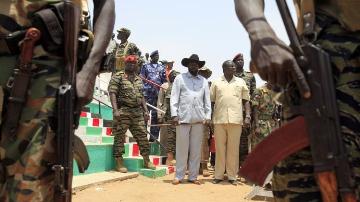South Sudan’s rival leaders to meet on Friday in Addis Ababa
May 7, 2014 (ADDIS ABABA) – South Sudanese president Salva Kiir and former vice-president turned rebel leader Riek Machar are scheduled for face to face talks in the Ethiopian capital, Addis Ababa, on Friday, where both warring parties have been unsuccessfully negotiating to end the more than four-month-old conflict.

Further, a presidential aide confirmed to Sudan Tribune that the president will travel on Thursday afternoon to Ethiopia.
“He will be going for two reasons. The first reason is to meet with Riek Machar in respond to the invitation by the mediation team which recommended the direct meeting with Riek Machar. This meeting takes place on Friday,” the official said Wednesday.
Rebels have also confirmed their leader was heading to the Ethiopian capital to meet Kiiir for the first time since December last year when the violence erupted between their loyalists and supporters.
“Yes, our leader, Dr. Riek Machar, will soon travel to Ethiopia to meet with Salva Kiir in Addis Ababa,” Machar’s spokesperson, James Gatdet Dak, confirmed to Sudan Tribune on Wednesday, adding that the opposition leader was also expected to hold an initial consultative meeting with the Ethiopian Prime Minister, Haile Mariam Desalegn.
Machar earlier downplayed the face-to-face talks with his former boss, when he on Friday told the visiting US secretary of state John Kerry that the meeting at this stage might be “counter-productive”.
UN secretary-general Ban Ki-Moon, however, revealed during his Tuesday visit to the South Sudanese capital that he spoke to Machar who also accepted to meet President Salva Kiir.
IGAD mediators on Tuesday issued a statement saying that the two leaders received an invitation from the Ethiopian prime minister and head of the regional body Hailemariam Dessalegn to meet on Friday.
The mediators “expect that this critical meeting will help end the violence and killings in South Sudan and provide the necessary impetus to the ongoing IGAD-led Mediation Process towards an inclusive and lasting political solution to the crisis,” the statement said.
Analysts say any disagreement between the two top leaders at this early stage of negotiations can weaken the negotiation teams who may face difficulties in reviving the negotiations.
DIFFERING POSITIONS
Differences over what to do in order to resolve the conflict are expected to emerge between the two leaders when they discuss the proposal for forming a power-sharing transitional government.
President Kiir, according to his aides, has expressed his willingness to form with Machar an interim government that would bring back together the two top leaders of the executive before conducting the next elections.
“He (Kiir) wants this conflict to be brought to an end so that a new page is opened, if the formation of the interim administration with Riek and his group can bring peace and stability to the country,” said a top aide in the president’s office on Tuesday.
The South Sudanese leader also assured both leaders of his readiness for direct talks with the rebel leader as a way to resolve the ongoing violence in the new nation.
“He had accepted the formation of transitional government in these meetings and has already authorised the delegation at the negotiation to go ahead with all the discussions, including the interim arrangements,” the presidential aide added.
However, Machar ,who was Kiir’s deputy for eight years, said there was need for the rival parties to agree first on a programme based on a federal constitution that should be implemented by the transitional government before elections.
He has since demanded restructuring of the state, including an overhauling reform in the public sector based on a new agreement and a federal constitution.
“Dr Machar has always made it clear that he wants the two parties, including other South Sudanese stakeholders, to first agree on what to do; hence a programme to implement in order to correct the status quo prior to the formation of the transitional government,” Dak said.
The former vicepresident, he added, differed with Kiir over issues of governance even when they were together as top executives in the presidency, “implying that the matter was not about power-sharing or personal conflict between the two leaders”.
Following a phone conversation with Kerry on Saturday, the rebel leader described to Sudan Tribune as “meaningless” a power-sharing transitional government without a workable programme.
The violence erupted in mid-December 2013 when president Kiir allegedly ordered his the unit commander of the presidential guards, Gen Marial Chinuor, to disarm Nuer soldiers among the guards, sparking the violence.
The presidential guards commander was also blamed for the alleged first massacre of thousands of civilians from the Nuer ethnic group in Juba.
Chinuor along with the rebel commander Gen Peter Gatdet, who was the first to defect in Jonglei state to Machar and blamed for massacres of Dinka civilians, were on Tuesday put under US sanctions for their role in the violence.
Kiir accused his former deputy of alleged coup attempt, but the rebels denied this accusation. Machar counter-accused the president of allegedly fabricating the coup plot story in order to get rid of his main political opponents.
UN has estimated tens of thousands of people have been killed in the violence, while more than a million have been displaced internally and to the neighbouring countries.
(ST)
